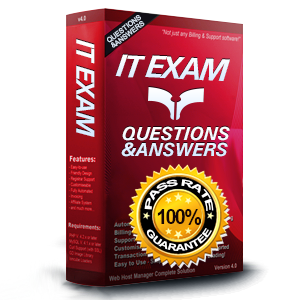
CAMS Exam Questions & Answers
Exam Code: CAMS
Exam Name: Certified Anti-Money Laundering Specialist (the 6th edition)
Updated: Apr 23, 2024
Q&As: 599
At Passcerty.com, we pride ourselves on the comprehensive nature of our CAMS exam dumps, designed meticulously to encompass all key topics and nuances you might encounter during the real examination. Regular updates are a cornerstone of our service, ensuring that our dedicated users always have their hands on the most recent and relevant Q&A dumps. Behind every meticulously curated question and answer lies the hard work of our seasoned team of experts, who bring years of experience and knowledge into crafting these premium materials. And while we are invested in offering top-notch content, we also believe in empowering our community. As a token of our commitment to your success, we're delighted to offer a substantial portion of our resources for free practice. We invite you to make the most of the following content, and wish you every success in your endeavors.

Download Free ACAMS CAMS Demo
Experience Passcerty.com exam material in PDF version.
Simply submit your e-mail address below to get started with our PDF real exam demo of your ACAMS CAMS exam.
![]() Instant download
Instant download
![]() Latest update demo according to real exam
Latest update demo according to real exam
* Our demo shows only a few questions from your selected exam for evaluating purposes
Free ACAMS CAMS Dumps
Practice These Free Questions and Answers to Pass the CAMS Certification Exam
According to the Second European Union Money Laundering Directive, what may knowledge of criminal conduct be inferred from?
A. Subjective, factual circumstances
B. Objective, factual circumstances
C. Objective, non-factual circumstances
D. Subjective, non-factual circumstances
A compliance officer at a small local bank reads in the newspaper that a high ranking local public official, who is a long-standing account holder, is being investigated by the competent authorities for accepting bribes. The compliance officer
immediately checks the official's account and new account the official opened at the bank a few weeks ago. The compliance officer's investigation of these accounts discloses that the official's long-standing account had no unusual activity
and that the recently opened had no activity since it was opened.
What should the compliance officer do next?
A. Wait until the new account receives funds and confirm their source
B. Call the competent authorities to assess the need to file a suspicious transaction report
C. Meet with staff who opened the account to understand its nature and purpose
D. Call the office to confirm the need for multiple accounts
The branch manager notices that a number of customers come in weekly and always use the same teller to process their deposits. The manager notices that the customers and the teller, who are from the same ethnic group, are speaking in a foreign language and every once in a while the customers from local ethnic restaurants will bring the teller lunch. The commercial customers that visit the teller generally deposit the same amount of cash each time they come in.
How should the branch manager respond to this activity?
A. Transfer the teller to another branch
B. Conduct further investigation before taking any other action
C. Encourage the teller to bring in more business from the ethnic community
D. Suggest to the teller to send the customers to other tellers to avoid the opportunity for collusion
A bank operates in multiple countries and offers a variety of products and services. The compliance officer recently joined the bank and wants to better understand the inherent level of anti-money laundering risk across the entire organization. Which two factors should be considered? (Choose two.)
A. The Transaction Monitoring program
B. The Customer Due Diligence program
C. Countries that the bank operates in
D. Products and services offered by the bank
What person or group is ultimately responsible for the institution's AML/CFT Program?
A. The AML audit committee
B. The AML/CFT Compliance Officer
C. The Chief Executive Officer (CEO)
D. The Board of Directors
Viewing Page 3 of 3 pages. Download PDF or Software version with 599 questions

